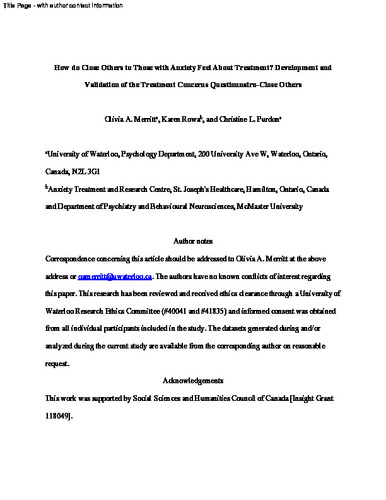| dc.contributor.author | Merritt, Olivia | |
| dc.contributor.author | Rowa, Karen | |
| dc.contributor.author | Purdon, Christine | |
| dc.date.accessioned | 2023-02-07 20:46:03 (GMT) | |
| dc.date.available | 2023-02-07 20:46:03 (GMT) | |
| dc.date.issued | 2022-07-19 | |
| dc.identifier.uri | https://doi.org/10.1007/s10608-022-10318-9 | |
| dc.identifier.uri | http://hdl.handle.net/10012/19159 | |
| dc.description | This is a post-peer-review, pre-copyedit version of an article published in Cognitive Therapy and Research. The final authenticated version is available online at: https://doi.org/10.1007/s10608-022-10318-9 | en |
| dc.description.abstract | Background. The close others (e.g., family members, romantic partners) of people with anxiety and related disorders are typically involved in their treatment decisions. However, we know little about close others’ attitudes towards and concerns about their loved one starting cognitive-behavioural therapy (CBT). Methods. Study one surveyed close others of those with anxiety and related disorders (n = 33) about their concerns about their loved one starting CBT. Thematic coding was completed, and items were developed to reflect these themes, comprising a measure of treatment concerns in close others. Study two involved the administration of the novel measure to a larger sample (n = 287) to evaluate its structure, reliability, and validity. Results. Close others endorsed having treatment concerns of moderate intensity. The final 17-item measure, the Treatment Concerns Questionnaire–Close Others (TCQ-C), has a robust four-factor structure, with internally consistent subscales including “Adverse Reactions”, “Personal/Family Consequences”, “Lack of Commitment”, and “Ineffectiveness”. The measure shows moderate correlations with treatment expectations (convergent validity) and small correlations with respondent distress (discriminant validity). Conclusions. The value of this measure for clinicians and future directions for research are discussed. | en |
| dc.language.iso | en | en |
| dc.publisher | Springer | en |
| dc.relation.ispartofseries | Cognitive Therapy and Research; | |
| dc.subject | treatment ambivalence | en |
| dc.subject | social context | en |
| dc.subject | anxiety and related disorders | en |
| dc.subject | therapy | en |
| dc.subject | family | en |
| dc.subject | psychometric evaluation | en |
| dc.title | How do close others to those with anxiety feel about treatment? Development and validation of the Treatment Concerns Questionnaire - Close Others | en |
| dc.type | Article | en |
| dcterms.bibliographicCitation | Merritt, O.A., Rowa, K. & Purdon, C.L. (2022). How do close others to those with anxiety feel about treatment? Development and validation of the Treatment Concerns Questionnaire - Close Others. Cognitive Therapy and Research, 46: 1157-1169. https://doi.org/10.1007/s10608-022-10318-9 | en |
| uws.contributor.affiliation1 | Faculty of Arts | en |
| uws.contributor.affiliation2 | Psychology | en |
| uws.typeOfResource | Text | en |
| uws.peerReviewStatus | Reviewed | en |
| uws.scholarLevel | Graduate | en |

